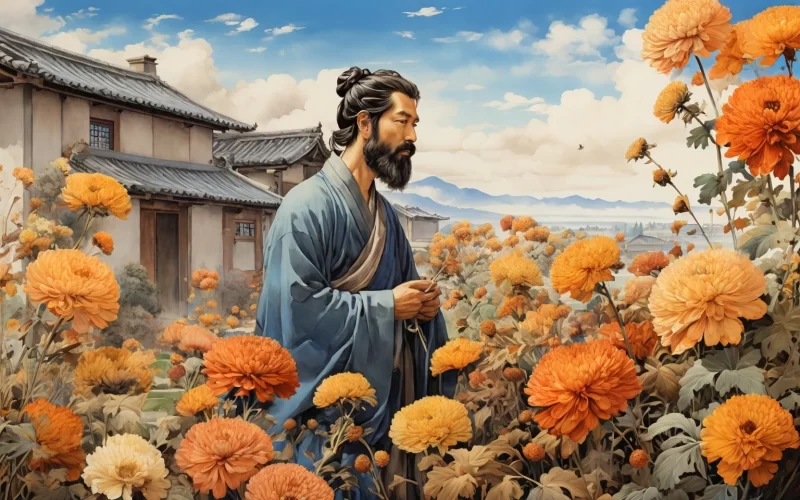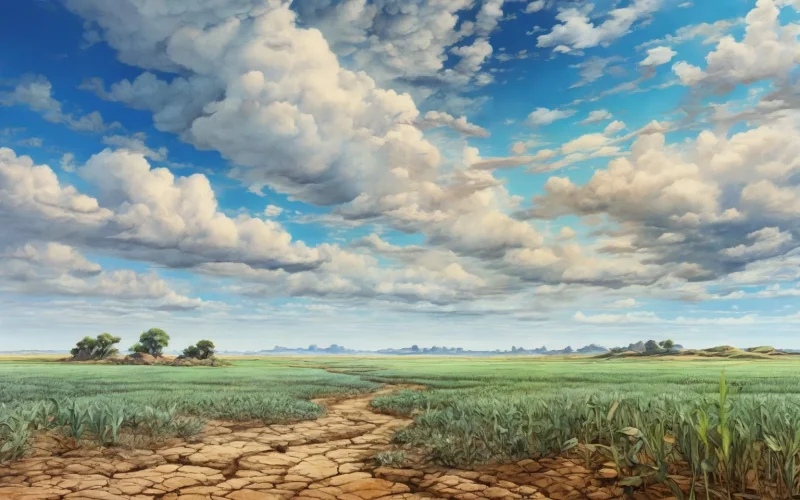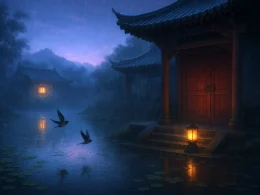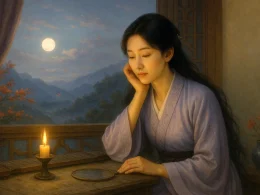When autumn comes, the Mountain-climbing Day is nigh;
My flower blows when other blooms come to an end.
In battle array its fragrance rises sky-high,
The capital with its golden armor will blend.
Original Poem
「不第后赋菊」
黄巢
待到秋来九月八,我花开后百花杀。
冲天香阵透长安,满城尽带黄金甲。
Interpretation
Composed around 875 AD amidst repeated civil examination failures, this poem channels Huang Chao's smoldering resentment through floral symbolism, transforming chrysanthemum imagery into revolutionary prophecy. Here, the autumn blooms embody insurgent resilience while "a hundred flowers" represent the corrupt ruling class—a stark political allegory.
First Couplet: "待到秋来九月八,我花开后百花杀。"
Dài dào qiū lái jiǔ yuè bā, wǒ huā kāi hòu bǎi huā shā.
When autumn comes on eighth September's day,
My blossoms reign—all other flowers slay.
The abrupt "when" pulses with imminent action, while the deliberately advanced date (traditionally chrysanthemums peak on ninth September) reveals revolutionary urgency. "My blossoms" signify both the poet and his insurgent forces; "all flowers slay" forges an irreversible causal chain—the old order's collapse guaranteed by the new power's rise.
Second Couplet: "冲天香阵透长安,满城尽带黄金甲。"
Chōng tiān xiāng zhèn tòu Cháng'ān, mǎn chéng jìn dài huáng jīn jiǎ.
Their sky-piercing fragrance battalions through the capital,
The entire city armored in golden floral.
"Sky-piercing fragrance" transmutes floral scent into insurgent spirit permeating the seat of power. The climactic vision of Chang'an armored in "golden floral" transforms petals into soldiers' battle gear—a breathtaking metaphor for revolutionary occupation. This is no floral description but a military maneuver in verse, forecasting the rebels' triumphant march.
Holistic Appreciation
Compact yet seismic, the poem fuses personal grievance with historical momentum. The first couplet's temporal focus (autumn's arrival) heralds inevitable regime change; the second's spatial conquest (fragrance engulfing the capital) manifests revolutionary inevitability. Huang's chrysanthemums shed all scholarly melancholy to become shock troops of history—their golden radiance outshining the decadent "hundred flowers" of the old regime.
Artistic Merits
Mastering symbolic parallelism, the poem progresses from seasonal inevitability to urban transformation through battle-charged metaphors: "slay," "battalions," "armored." Each phrase doubles as horticultural description and military manifesto. The pounding tetrameter rhythm mirrors insurgent drums, making this less a poem than a verbal standard rallying the dispossessed.
Insights
This floral jihad crystallizes a universal truth: when systemic oppression freezes social mobility, revolution becomes the only harvest. Huang's chrysanthemums teach us that marginalized forces, though autumnal and seemingly fragile, carry latent power to reclothe empires. The poem's enduring resonance lies in its alchemical transformation of resentment into constructive destruction—a manifesto for all who would remake frozen systems. These golden blossoms armor not just ancient Chang'an but the eternal human will to remake unjust worlds.
Poem translator
Xu Yuanchong (许渊冲)
About the poet
Huang Chao (黄巢), 820 - 884 A.D., a native of Heze, Shandong Province, was a leader of peasant revolts at the end of the Tang Dynasty. Huang Chao came from a family of salt merchants, good at horseback riding and shooting, with a rough knowledge of writing and ink, and little poetic talent. Huang Chao could read poems at the age of five, but as an adult, he failed to pass the exams. In 884 AD, Huang Chao was defeated and died in Wolf Tiger Valley.












